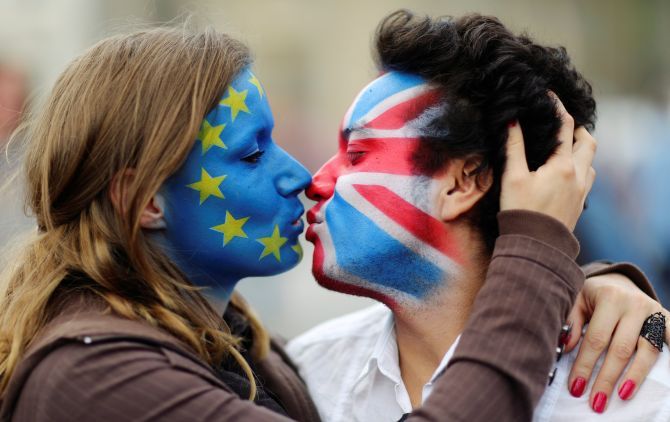 | « Back to article | Print this article |
 'The project of a united Europe has constantly been made and remade.'
'The project of a united Europe has constantly been made and remade.'
'The national borders have changed many, many times and so have the languages.'
'Britain's exit is only the latest episode in this long history,' says Aakar Patel.
The project to make a European Union is the oldest in the world. The British exit from the Union is the latest episode in this project which goes back to ancient history.
The Greeks did not think much of their northern and western European neighbours. They called them Barbarians because they thought their languages sounded like 'bar-bar'.
Alexander the Great of Macedonia had no interest in Europe either. He came south to first conquer Greece. Then he swung east and came towards Asia. After a short detour in Egypt, he conquered Persia, much of Central Asia and Afghanistan before fighting his hardest battle in Punjab and being forced to turn around, dying in Iran at 33.
Three centuries after him, Julius Caesar was the first individual to make significant progress in bringing Europe under one authority. A few decades before the birth of Christ, Caesar led the Italian army into France and Germany, and he tamed many of their wild tribes.
He also brought the Italians to England and the cosmopolitan city London (which voted against Brexit) goes back to that time. Europe in this period was ruled from Rome.
Caesar's successor Augustus halted Roman expansion northward after a huge defeat in the German forest of Teutuborg in 9 AD. The urban and civilised population of Europe was in this period entirely in the southern part of the continent.
The north, today the most economically advanced in the world, was then a wild area not worth fighting over. Rome's armies from now on would march east, towards Jerusalem and Syria. They established a new capital for the empire, today called Istanbul.
In the west, German tribals, who had no script and were mostly illiterate, overwhelmed Rome by the fifth century AD. This brought in the period called the Dark Ages. Writing and reading declined in Europe. This happened partly because the Muslim conquest of Egypt stopped the export of the only paper available at the time, called papyrus, and books stopped being written and copied easily.
A new purpose for unifying Europe now emerged: Christianity. The Arab conquest of Spain in the same period provided the fear (similar to today's phobia over Syrian immigrants) to hasten this development.
The Pope in Rome crowned a German tribal chief called Charles as the first Holy Roman Emperor. His historical name, Charlemagne, means Charles the Great. In the centuries that followed came the development of feudalism in Europe and then the rise of large monarchical States. Powerful kings, particularly in France and England, divided and ruled Europe.
Charlemagne's great grandson Charles the Fat was the last man to rule a unified Europe in this era.
The period after this saw the rise of the church in Rome as a military and political power. It was able to influence Europe's kings to leave their kingdoms to battle for the reconquest of Jerusalem, a failed war called the Crusades.
Protestantism in Germany, and then in England, divided the thin religious ties of Europe and the church declined as Muslim power grew in the east. The scientific revolution in Europe brought the continent back to the dominance it enjoyed during the time of Rome.
Military technology helped Napoleon conquer and unify Europe briefly, for the first time in 1,000 years.
In the early 1940s Hitler again unified Europe militarily when in a matter of months his armies conquered the entire continent. The parts he did not occupy (like Italy) were either occupied later or allied with him. Only the British isles were outside his control.
The end of the Second World War and the rise of Russia also unified Europe militarily. This happened with the formation of NATO which is located in Brussels but with the real power lying in America.
This cooperation extended to the European Union, also located in Brussels (in a building named after Charlemagne). After the reunification of Germany 25 years ago, the real centre of power of the EU is Berlin.
The project of a united Europe, from Charlemagne to the EU, has constantly been made and remade and the causes have been varied: military expansion, religion and trade. The national borders have changed many, many times and so have the languages.
Britain's exit is only the latest episode in this long history.
We'll end on an interesting note. The word France comes from a German tribe, the Franks, who conquered and populated the area and are mingled among today's 'Frenchmen'. The same tribe gave its name to the German city of Frankfurt.
The word England means land of the Angles, a north Germanic tribe that conquered that area centuries ago. Northern Italy is called Lombardy after another German tribe.
In that sense the Germans have already permanently unified Europe with their genes.
Aakar Patel is Executive Director, Amnesty International India. The views expressed here are his own.
IMAGE: Activists with the EU flag and Union Jack painted on their faces kiss in front of the Brandenburg Gate in Berlin, Germany, to protest against the British exit from the European Union. Photograph: Hannibal Hanschke/Reuters